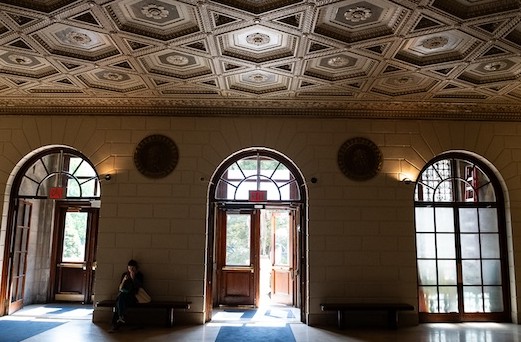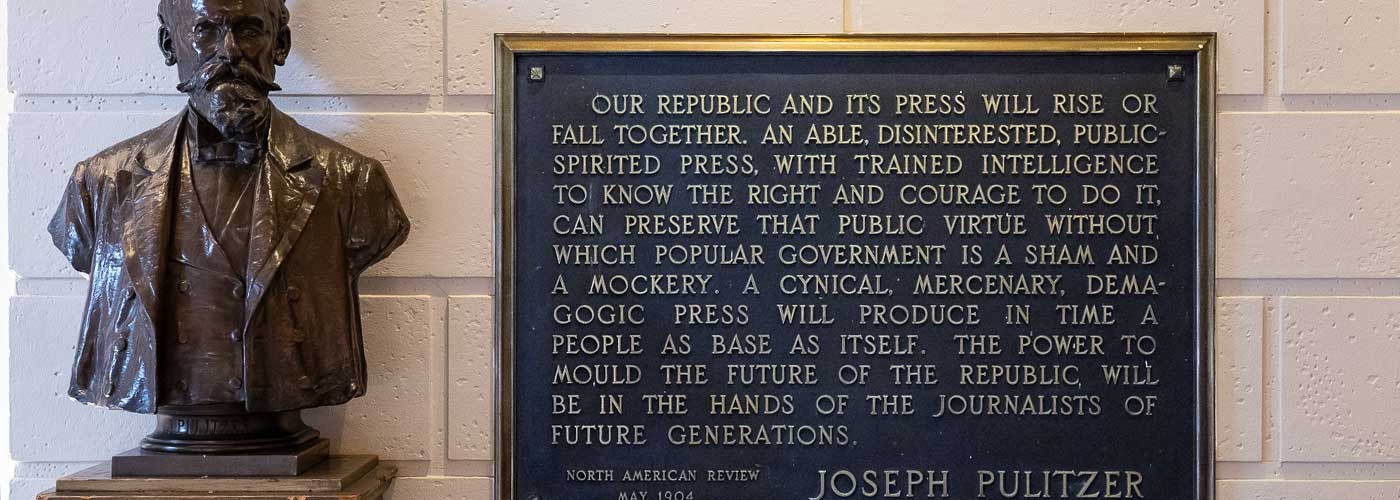
Reporting begins here.
Columbia Journalism School is global, influential and innovative.
Centered in the media capital of the world, it leads the way to a better future — backed by more than 100 years of experience in educating trailblazers of the industry.
The school's tradition is rooted in the bedrock values of ethics — and it looks forward, with cutting-edge innovation and media scholarship.
The school works to ensure journalism becomes more accessible. More diverse voices better tell the story of democracy — and help fortify it further.
The Mission: Upholding Pulitzer’s Legacy
More than a hundred years after his death, the name Pulitzer is all but synonymous with journalism of the highest caliber. Yet little more than a century ago, Pulitzer was an extraordinarily controversial figure.
Coverage of the Spanish-American war led to a calamitous press war that had soiled his name. Alarmed, Pulitzer determined he would use his fortune to enshrine the highest values of journalism in two prominent ways: the Pulitzer prizes, and a great school of journalism.
Today, Columbia Journalism School’s purpose is to educate students from all over the world to become conscientious, accomplished professional journalists. As a school we uphold the belief that a multiracial, multicultural democracy requires vigilant and consistent reporting on the rights and experiences of all people; and that journalism’s obligation is to the public and that it must remain independent and transparent about its methods and affiliations and responsible for its errors.
“A journalist is the lookout on the bridge of the ship of state.”
Columbia Journalism School lives up to that purpose and has done for more than a century. At the heart of the School's mission — training reporters to cover a multifaceted and ever-changing world — is the precept that the journalism community must be an authentic reflection of that world. Columbia Journalism School believes that meaningful representation of minority groups is essential to telling the full story.
Rigor and Excellence in Academics and Beyond
Columbia Journalism School programs are intensive and demanding. Their students come from nearly 50 countries and a wide range of backgrounds. Alumni can be found in prestigious news organizations across the globe where they are active in every phase of making the news.
The Journalism School administers several prestigious awards that uphold the standards of media excellence. And it is also the home of the Columbia Journalism Review, which sets the gold standard for reporting and analysis on the media industry and on the news.

Looking to the Future
As Columbia Journalism School moves forward, embracing the challenges and opportunities of the 21st century, Pulitzer’s legacy endures.
Under the leadership of Dean Jelani Cobb and a distinguished faculty, the Journalism School continues to drive initiatives that educate top journalists, uphold standards of excellence for the profession as a whole and ensure that the press strives for the public good.
Board of Visitors
The Board of Visitors meets with the Dean and his leadership team to provide input and guidance in matters involving the school. CJS is extremely grateful for this group of professionals who volunteer their time and expertise. See the full list of members here.
Accreditation
Columbia University is accredited by the Middle States Commission on Higher Education, 3624 Market Street, Philadelphia, PA 19104; 267‐384‐5000 (MSCHE).
Columbia Journalism School is accredited by the Accrediting Council on Education in Journalism and Mass Communications (ACEJMC).
